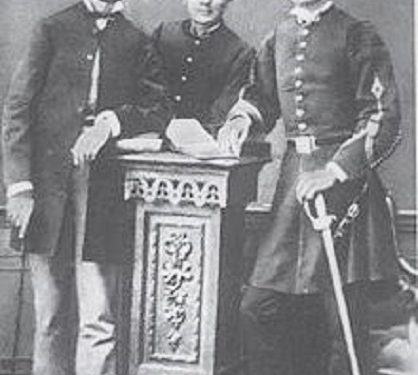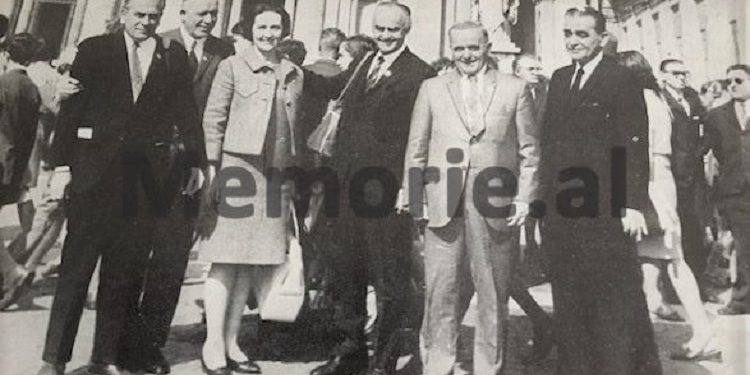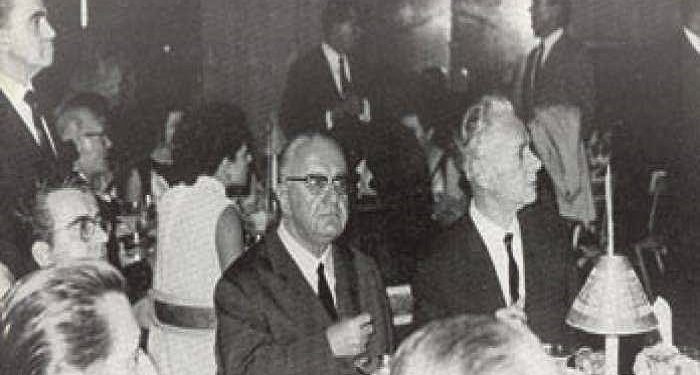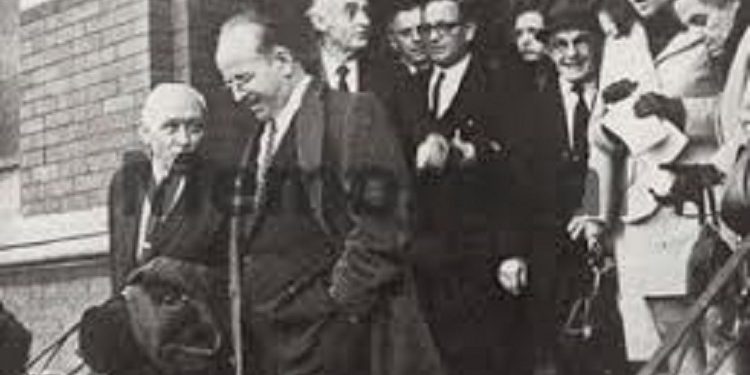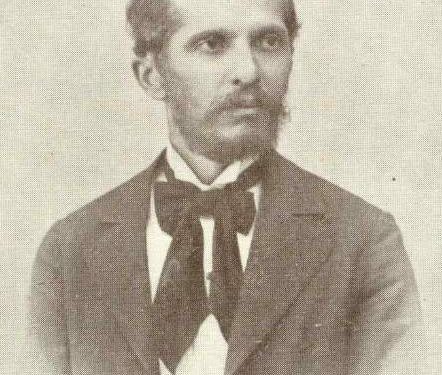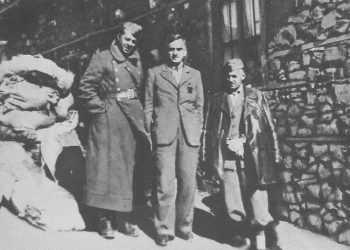By Namik Resuli
Memorie.al/In 1937, when the twenty-fifth anniversary of our independence was celebrated, many of us thought that, at least from a national point of view, the role of Naim’s poetry message had ended: Albania was created as a nation and was imposed as state among other Balkan states. But the years that followed shattered our conviction and the events that unfolded during those years brought Naim among us as he appeared on the scene of our history here ninety years ago. Today Naimi is all “current” among us, not only as a poet, but also as an apostle of nationalism and freedom.
This wonderful event, this perpetuation and renewal in times, Naimi owes to the power of his mind and the height of the feelings that accompanied that mind. He is current today as an apostle, as a messenger of worldly love, as a preacher of “goodness”: here is a word created by Naim himself, in which in a blazing synthesis many meanings are concluded, such as that of love, of the wisdom of the soul, of mercy in the most humanistic sense of the word.
The word “kindness” has filled Naim’s verses from beginning to end. With this word he appealed to his compatriots not to give up the savagery of their customs, to be especially safe from blood. It is topical for his oversight in politics. Ninety years ago Naimi showed the Albanians the West as an example of civilization, because after his opinion only from that side, and not from the East, the light comes.
We all remember one of his longing poems: “For what? / Why does not the good day come / Why does it not come? / Until in the dark? /Do not God like you? / Do not even throw a fence / And hurry up a little, / O white day, / And collar, collar, / That I wait for you / I do not die./ I wish you a happy day, / That lint from the west, / At’an ‘has illuminated, / why do you forget us? Apparently, even ninety years ago there was a fence separating Albania from the West.
He is current as a poet. A personality endowed with an extraordinary spirituality and religiosity, no matter how he started from the Persian mystical poets, to whom he was led by his gentle nature and the Bektashi belief, nothing, created a whole philosophical and religious world, in which the concept of the universe and that of God can be exchanged for pure poetry, giving their author a very special place in European literature.
Naim’s universal poetry
The new critique has therefore focused all its attention on this part of Naim’s poetry, which poetry becomes truly “universal”, because the subject matter it carries flies beyond the bounds of personal feelings and echoes in a fiery embrace of the whole universe. Cosmic poetry, therefore, and not only mystical, burned and scorched by that creative flame, which is love and kindness. To find another rival Naim in love for all the creatures of the universe we must ascend back in the centuries and reach as far as St. Francis of Assisi; although our poet has no companion in European literature for the genre of his notes.
But the purpose of my lecture is not to dwell on this point, if I beat one of the most outstanding and neglected issues of the Naimian world: His religious thoughts. On this issue, alas, we have not had deep and special studies until today, why the face of the poet has always cast a shadow on the face of the religious. We can even say that this second face has not even been seen by scholars at all. It seemed reasonable to me, therefore, to mention this so interesting problem in this our American meeting, why I would hardly be given another occasion to have all the competent representatives of the two religions present together: Christians (Catholics and Orthodox) and Muslims) (Sunnis and Bektashis).
Naimi has left his religious thoughts in two books: “Lessons”, published in 1894 and “Bektashi Notebook”, which came out in 1896. With “Bektashi Notebook”, within 14 pages in prose, Naimi seeks to convey to his fellow-believers a brief doctrine of Bektashism. The esoteric and reserved belief of this doctrine is known to the learned only in a general and superficial way. “Everything is in man, even the true God himself / That when he had to go out in the flat he made man with his faces / The Bektashis believe that man does not die, but only changes and is changed and is always towards God, that to the son pshihet’i ati “. We are not entering here into the issue of philosophical discussion on the essence of Bektashism, why it does not enter into the aims of our paper.
We will ask, despite a question that has to do with the philology of the book: What Bektashism does Naim’s “Notebook” give us? Traditional Bektashism as it was treated in Albania, or a reformed Bektashism? What were the sources on which it was based? Here is a very attractive topic, which deserves to be beaten at length, because among the scholars of the West I do not know who has dealt with it, therefore only any competent Albanian, who is found here, can make us light. If Naimi really acted as a reformer by compiling the “Bektashi Notebook”, this fact should be underlined and the search for a deeper and fuller knowledge of his activity in this field should be continued.
Naim understands of God
Yes, we believe that the next book is much more interesting for Naim’s religious activity, I mean “Lessons”, a booklet of about 50 pages, all in prose and divided into four chapters: 1) God is true and true , 2) The eternal law of the Albanians, 4) The essence of the Qur’an. “Lessons” is one of those books that leaves the reader open-mouthed. Reading it has been a revelation for us. In the first chapter the traditional explanation of God’s being is mixed with the knowledge of the scientific discoveries of the West, which is unlikely in the religious books of the East.
Here are some excerpts from the Tirana edition made in 1942, p. 29: “Teach the wise men of the universe, then you will understand the power and goodness of God.” “Without seeing the universe without side without pound and its eternal law without flaw.” “Stars without starting and without ending come around in the sideless spaces hurrying with math run”. “They never got out of the way, God forbid. In order not to try each other and not to stay in the way, he put the power of removal and the power of expulsion!” “The middle stars shed light on the rotating stars that come around them, even the followers, who have the rotating ones!”. “God is the King of the universe, the light of the universe! For the very essence of God and the God-man relationship, Naimi writes, p.31:” Glory be to God, Who made the universe and the universe itself! “When the true God wanted the math to appear in the square with his math, then lead a human life in his face! P.32:” All that is the face of God, all that he hears is the voice God. “” God with his mat is a sea without side and we are the waves of “.
Here, too, we see, then, a unity, a confusion of the essence of God with nature, or as he calls it, with the universe. Two conclusions can be drawn from this principle: first, the deification of man in as many parts of the universe as he is confused with God; second, the denial of another transcendental world, just as in the Bektashi principles we saw above and not as following the Muslim principles. Yes in “Lessons” Naimian pantheism is almost whispered, we mean that it is not underlined as strongly as in other parts of his works, and gives way to the face of the traditional God of the three monotheistic religions. To note another very important point: man’s position towards God, man for Naim is no longer a slave of God, but a man free to judge and choose. The free arbiter of the Christian religion puts it here, and so the opposition to Muslim doctrine becomes even more severe and insurmountable. Quranic fatalism disappears from his belief.
In the second chapter, “Wisdom”, the same concepts of the first chapter are briefly repeated. Much more interesting for the understanding of Naim’s religious intentions is the fourth chapter “The Essence of the Qur’an”. This title, as in our opinion, may even confuse the reader at first, because whoever reads it carefully notices that the Poet is far removed from Qur’anic orthodoxy. This departure is especially due to some of Naim’s expressions regarding the Christian religion. The Christian influx, which is observed in all his works, occupies a fundamental place here. In “Lessons” we find whole phrases taken from the Gospel; thus on page 33 we sing: “If you have two shirts, one is the epitome of the one who does not have, in the other one the rhinoceros, here and there, love the friend, love the enemy, what the father will not do to you, do not you, father, do to every man what he will do to you. ” On page 37 some of the gospel principles: “Thou shalt not steal, thou shalt not steal, thou shalt not take, thou shalt not eat of the world, thou shalt love thy mother and thy father, thou shalt love thy sister and thy brother, thou shalt love thy neighbor and all mankind.” , overcome anger, forgive the guilty, do good to humanity, do not be unfaithful, keep your word, remember God, love poverty, do not lie and do not ridicule and remove humanity, do not slander, do not curse, do not beat, do not shout, do not be lazy, do not work, do not quarrel, do not deviate from the right and the truth, do not boast, do not boast… “.
On page 45: “Yes the Good said: Marry and multiply.” And still on p. 69 writes: “The wise Lord forgave Christ the son of Mary the wisdom and the beautiful word from infancy, gave him the gospel and the light.” Christ said to your servants: Who comes with me in the ways of the Lord? They answer you: we come. Without saying: True God! We believed in what came down to you, and we followed your messenger, write to us with the witnesses. “Christ is the Spirit of God… F.77:” Without sending the angel to Mary, and honoring her and Christ’s servants… “In” Summer Flowers “Naim dedicates a poem to the whole of Christ with the title “Before Christ”; here too the Poet calls him “the Son of man of God”, and, contrary to what he had asserted on p.69 of the “Teachings”, he accepts the gospel testimony of the death of Christ, who was crucified for the salvation of humanity of the face of Christ
Naim’s actuality
We are getting permission, so let’s read them all, why boy who is difficult for many to get their hands on a copy of “Summer Flowers”. “Son of man of God, / Your face tells me / Ah, the evils of humanity, / Who has worked and is working.” Now the question arises: what were the motives that prompted Naim to write such a work? Did he write the “Teachings” to ease the rift between Muslims and Christians? Or did he intend to create a new religion, a new faith, post-apostasy for the divided Albanians? A definite answer is difficult to give today, because as I said before, investigations and studies have not been done until today on the secret corner of Naim’s religious world.
We have the texts, really. When the reader reads especially the first chapter of the work, he has the clear impression that Naimi really intended to give the Albanians a common religion, a national faith, by participating in the Christian religion and connecting these in a theism, just as Bektashism suggested. On p.53-54 Naimi writes: “A computer has a language, all who speak one language are the sons of a Motherland, all the sons of a mother and a father, have a blood, a self ‘ and of a consciousness, a face, bring it closer to one way. “Thus all the sons of a Motherland truly have a faith, because they believe in all the true and true God, who is the Lord of lives and of the universe without On the other hand, they believe in the Good, and good in the good, and evil in the evil, so they all believe in one religion. ”
It may be thought that the third chapter, the Eternal Law of Albanians, annihilates these assumptions of ours, but in reality it is not so. This chapter has no doctrinal content; there Naimi advises Albanians the greatest tolerance from every point of view. Even if this is not the case, one thing remains certain: that Naim with his prophetic vision took the first steps of brotherhood, of the union of religions. It seems to us, therefore, that, today, when there is talk of “ecumenism” from all sides, Naimi is more than current even at this point.
Who was Professor Namik Resuli?
Namik Resuli was born in 1911 in the city of Lushnja, where he comes from and the origin of his family is one of the most famous in all of Myzeqena. In the early 1930s Namik graduated from the University of Florence with a degree in Italian Language and Literature. After graduation he returned to Albania and worked for a long time as a teacher of Literature in some of the high schools of the country. In 1939, he published at the Publishing House “Gurakuqi”, the famous poem “Milosao” by De Rada, which he adapted from Arbërisht in the Albanian literary language. That publication had a great echo at the time and was considered one of the most accomplished works published for De Rada. During the years of fascist occupation, Namik Resuli worked at the Institute of Albanian Studies together with Ernest Koliqi, Father Zef Valentini, Alexander Xhuvani, Hasan Dosti, Father Anton Harapi, etc. Shortly before the end of the war, Namik Resuli left Albania and settled in the city of Turin, near the family of his Italian wife. From that period until he retired in 1971, Namik worked as Head of the Department of Albanian Language at the Institute of Oriental Studies in Naples. During that time he undertook studies on the history of Albanian literature and albanology, republishing Buzuku’s work. Although a valuable contribution to Albanian literature, the communist regime in Albania had declared Resuli an “enemy of the people” and in 1979, during a meeting with writers and artists in Tirana, Enver Hoxha severely attacked Prof. Resulin, calling him “an aristocratic bey”, also for the fact that he had done a study on Faik Konica. Prof. Namik Resuli, died in the city of Turin in the early 80s. The study published in this article about Naim Frashëri was written by him in 1968 and was held in a scientific session organized by the “Vatra” Society in 1969 in Detroit./Memorie.al
(Prepared by D. Kaloçi)




